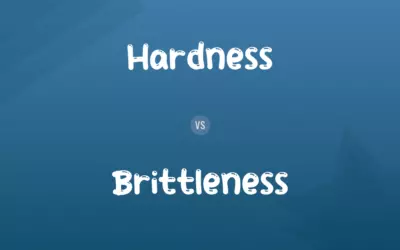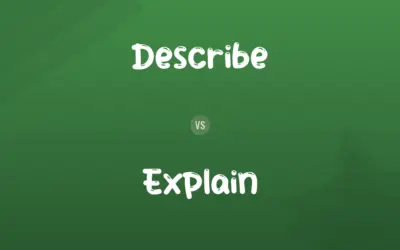Oftenly vs. Often: Difference and Comparison
Edited by Muazma Batool — By Muneeza Rehman — Updated on September 9, 2023
"Often" is a commonly used adverb meaning "frequently," while "oftenly" is an outdated and rarely used form of the same word.

Difference Between Oftenly and Often
"Often" and "oftenly" both have roots in expressing frequency, but their usage in contemporary English is distinct. "Often" is the preferred and standard way to describe something happening regularly or many times. It's used extensively in English-speaking countries and is accepted in both formal and informal settings. For example, "I often visit the park," indicates a habitual action.
Muazma Batool
Sep 09, 2023
"Oftenly," on the other hand, is an archaic form of "often." While its existence is acknowledged in some older dictionaries, modern English speakers, writers, and grammar experts avoid using it. It's redundant because "often" already conveys the sense of frequency without needing the "-ly" suffix. Thus, it's quite rare to encounter "oftenly" in modern writing or conversation.
Muazma Batool
Sep 09, 2023
Interestingly, the evolution of language has a way of phasing out certain words, and "oftenly" is one of them. Words change, adapt, and sometimes even fade away, based on their utility and common acceptance. In the case of "often" versus "oftenly," it's clear that "often" has won the favor of contemporary English speakers.
Muneeza Rehman
Sep 09, 2023
In practice, if someone uses "oftenly," it might be considered a mistake or an old-fashioned way of speaking. Those learning English are typically guided to use "often" to ensure clarity and adherence to modern usage.
Olivia
Sep 09, 2023
Oftenly vs. Often Comparison Chart
Acceptance
Not widely accepted in modern English
Widely accepted in modern English
Muneeza Rehman
Sep 09, 2023
Context in Sentences
Rare in contemporary contexts
Standard in most contexts
Muneeza Rehman
Sep 09, 2023
Oftenly vs. Often Definitions
◉Oftenly
An infrequent term in modern language expressing repetition.
It rained oftenly during those months.
William
Sep 09, 2023
◉Often
An adverb indicating something happens many times or regularly.
She often reads before bed.
William
Sep 09, 2023
◉Oftenly
An archaic adverb indicating frequency.
He would oftenly take long walks in the evening.
Muazma Batool
Sep 09, 2023
◉Often
Used to express the frequency of an action.
I don't often eat ice cream.
Muazma Batool
Sep 09, 2023
◉Oftenly
Non-standard way to describe habitual actions.
They would oftenly gather around the fireplace.
Muneeza Rehman
Sep 09, 2023
◉Often
Describing events that are not always but not rare.
It often rains in Seattle.
Kaitlyn
Sep 09, 2023
◉Oftenly
Outdated form of the word "often."
She was known to use terms like oftenly in her speech.
Muazma Batool
Sep 09, 2023
◉Often
Frequently; many times.
I often walk to work when the weather is nice.
I've been going to the movies more often since a new theatre opened near me.
Muneeza Rehman
May 03, 2023
◉Often
frequently or in great quantities;
I don't drink much
I don't travel much
Muneeza Rehman
May 03, 2023
Oftenly vs. Often Frequently Asked Questions
Which word is more frequently used?
"Often" is more frequently and widely accepted than "oftenly."
Muazma Batool
Sep 09, 2023
Which word is preferred in academic or professional settings?
"Often" is the preferred choice in most settings.
Muazma Batool
Sep 09, 2023
Is the pronunciation different between the two?
Yes, "oftenly" has an additional "-ly" sound at the end.
Muneeza Rehman
Sep 09, 2023
Is "oftenly" a correct word in English?
"Oftenly" is an archaic form and is not commonly used in modern English.
Muneeza Rehman
Sep 09, 2023
Why is "oftenly" considered redundant?
"Often" already conveys frequency, making the "-ly" suffix in "oftenly" redundant.
Muneeza Rehman
Sep 09, 2023
Are there alternatives to "often"?
Yes, words like "frequently," "regularly," and "usually" can be used as alternatives.
Kaitlyn
Sep 09, 2023
Can I use "oftenly" in formal writing?
It's recommended to use "often" in both formal and informal contexts.
Nolan
Sep 09, 2023
How do I know when to use "often" in a sentence?
Use "often" when describing something that happens regularly or many times.
Levi
Sep 09, 2023
Is "oftenly" found in dictionaries?
While "oftenly" might appear in older dictionaries, it's absent or marked as outdated in many modern ones.
Muneeza Rehman
Sep 09, 2023
Why has "oftenly" fallen out of favor?
Language evolves, and redundant or less useful forms, like "oftenly," tend to fade away.
Muneeza Rehman
Sep 09, 2023
Content Creators
Written by
Muneeza RehmanAt Comparisons.wiki, Muneeza skillfully navigates the vast sea of information, ensuring clarity and accuracy as the lead content editor. With a keen eye for detail, she curates every comparison to enlighten and engage readers.
Edited by
Muazma BatoolAs a content editor, Muazma Batool is not just a grammar guru but a creative mastermind who breathes life into every word. With an eagle eye for detail and a passion for storytelling, she transforms bland text into engaging content that captivates audiences and drives results.






























